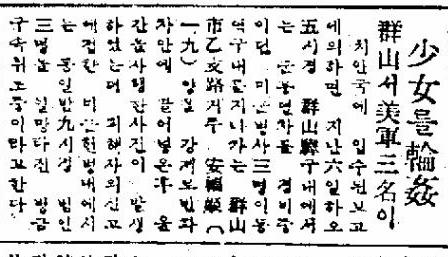More Korean men working in Japanese host bars.....Bahk said, “Brokers are using enticing language, such as guaranteed salaries of 10 million won a month, good working conditions and language training to recruit people to send to Japan’s amusement quarters......Experts worry that since many Japanese make simple comparisons between Korean prostitution in Japan and the World War II comfort women, overseas prostitution of this sort could lead to stereotypes about Koreans.
Naver2007-03-27 10:09]*
But how can people miss the similarity between Korean brokers under and after Japanese rule and the these brokers?
via
Marmot...............................................................................
*
일본 성매매·유흥업소 취업 까페가 성업중에 있으며 최근에는 한국 남성의 일본 호스트 바 취업까지 늘고 있다는 주장이 제기됐다.
日本性売買·遊興業店就業カフェが盛業中にあり最近には韓国男性の日本ホストところ就業まで増えているという主張が申し立てられた.
한나라당 박재완 의원(보건복지위)은 27일, 일본 성매매·유흥업소 취업 카페가 2006년10월 부터 2007년3월까지 70개 활동하고 있으며 한국 남성의 일본 호스트바 취업 카페는 15개가 활동하고 있다고 밝혔다.
ハンナラ党薄才とは議員(保健福祉委員会)は 27日,日本性売買·遊興業店就業カフェーが 2006年10月から 2007年3月まで 70個活動しているし韓国男性の日本ホストバー就業カフェーは 15個が活動していると明らかにした.
현재 일본 내 한국인 불법 체류자는 4~6만명으로 추산되며 이들 중 3만 여명이 성매매·유흥업소에 종사하는 것으로 추정되고 있다.
現在日本内韓国である不法滞留者は 4~6万名に推算されてこれらの中で 3万名余が性売買·遊興業店に携わることに推定されている.
여기에 이제는 국내 호스트 바가 포화상태에 이르자 일본 호스트 바로 한국 남성의 진출이 크게 늘고 있다는 지적.
ここにこれからは国内ホストところが飽和状態に至ると日本ホストすぐ韓国男性の進出が大きく増えているという指摘.
박 의원은 "브로커들이 카페에서 월 1천만원대의 소득 보장, 좋은 근무조건, 어학 연수 등의 감언이설을 동원, 사람들을 모집해 일본 유흥가로 송출하고 있다"고 설명했다.
朴議員は "ブローカーたちがカフェーで月 1千万遠大の所得保障,良い勤務組でも,語学研修などの口車を動員,人々を募集して日本遊興街で送り出している"と説明した.
무엇보다 박 의원은 문제는 일본 특유의 복잡하고 정교한 벌칙 조항들 때문에 한국인이 일본 유흥가나 사창가에서 돈을 모아 귀국하기는 사실상 어렵다고 강조한다.
何より朴議員は問題は日本特有の複雑で精巧な罰則条項たちのため韓国人が日本遊興街や売春町でお金を蓄えて帰国することは事実上難しいと強調する.
이와 함께 일본 유흥가 취업과 관련해 주민등록증, 운전면허증, 여권, 호적 등 신분증 위조조직․밀입국조직이 개입한 흔적도 밝혀졌다.
これと共に日本遊興街就業と係わって住民登録証,運転兔許証,パスポート,戸籍など身分証偽造組職密入国組職が介入した跡も明かされた.
박 의원이 작년 10월말 유흥업소 취업 카페에서는 신분증 위조조직이 취업·신분위장 등을 위해 주민등록증(남자 40만원, 여자 60만원), 운전면허증(남자 70만원, 여자 100만원) 위조(남자 24명, 여자 11명)를 광고하는 것을 포착한 것.
朴 議員が去年 10月末遊興業店就業カフェーでは身分証偽造組職が就業·身分偽装などのために住民登録証(男 40万ウォン,女 60万ウォン),運転兔許証(男 70万ウォン,女 100万ウォン) 偽造(男 24人,女 11人)を広告することを捕捉したこと.
무엇보다 한국 종사자들의 여권을 일본 유흥업소에 맡기도록 하는 경우가 종종 있어 여권 위조의 위험과 함께 거주 이전도 제한되는 등의 유흥업소에 종사하는 한국인이 인권침해와 안전문제에 시달리는 것으로 추정되고 있다.
何より韓国従事者たちのパスポートを日本遊興業店に任せるようにする場合がたびたびあってパスポート偽造の危険とともに居住以前も制限されるなどの遊興業店に携わる韓国人が人権侵害と安全問題に苦しむことに推定されている.
이 에, 박 의원은 일본에서 성매매·유흥업소에 종사하는 한국인의 실태를 조사하고 대응책을 마련할 것을 촉구하며 조직적으로 일본 성매매·유흥업소 취업을 알선하는 인터넷 카페를 조사해 카페 운영자와 브로커들을 사법조치하는 한편 포털은 일본 유흥가 취업 알선 카페들을 ‘블라인드’(blind) 처리할 것을 주장했다.
こ れに,朴議員は日本で性売買·遊興業店に携わる韓国人の実態を調査して対応策を用意することを促して組織的に日本性売買·遊 興業店就業を斡旋するインターネットカフェーを調査してカフェー運営者とブローカーたちを司法処置する一方ポータルは日本遊興街就業斡旋カフェーたちを ‘ブラインド’(blind) 処理することを主張した.
또한 일본 경찰과 공조해 공문서 위·변조 카페를 근절해야 한다고 덧붙였다.
また日本警察と共助して公文書上·変造カフェーを根絶しなければならないと付け加えた.
한편, 이 같은 일본 원정 성매매에 대해 적지 않은 일본인들이 종군위안부와 원정 성매매를 단순비교하고 있어 한국인에 대한 편견이 생길 가능성이 높다고 전문가들은 우려하고 있다.
一方,このような日本遠征性売買に対して少なくない日本人たちが従軍慰安婦と遠征性売買を単純比較していて韓国人に対する偏見が生ずる可能性が高いと専門家たちは憂慮している.





